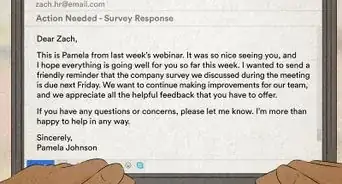This article was co-authored by Hyungbum Kang, MA, MSW, LCSW, MAC. Hyungbum Kang is a Licensed Clinical Social Worker based in Honolulu, Hawaii. With over a decade of experience, Hyungbum specializes in using an integrated therapeutic approach to treat ADHD, Anger Management, Depression, and other mental health and social work struggles. He received a Bachelor’s degree in English and Master’s degrees in Sociology and Social Work. Hyungbum earned an MBA from Hawaii Pacific University (HPU) and is working on his Doctor of Psychology from HPU. He is a member of the American Psychological Association, the International Honor Society in Psychology, the National Association of Social Workers, and the California Consortium of Addiction Programs and Professionals.
There are 10 references cited in this article, which can be found at the bottom of the page.
This article has been viewed 515,810 times.
Rumors, smears, and unjust characterizations can happen online, in the workplace, and in the courtroom. Some false stories die, and some spread. Whether you're falsely accused to your face, behind your back, in the court, or in print, it is vital to stay calm and know your rights. With patience, and the support of those you trust, you can work toward recovering your reputation and self-confidence.
Steps
Responding to Rumors
-
1Gather yourself. If a coworker, acquaintance or loved one accuses you of something you have not done, it is best to confront them calmly and directly. If you are being accused face to face, you may have to take a deep breath before you begin. If the accusations come to you as a written or recorded message, you will have the opportunity to wait and respond when you are calm and collected.[1]
-
2State the facts. Once you are calm, state the truth as concisely as you can and provide evidence.[2] If your accuser is ready to hear you, this can save a lot of back and forth. If your accuser is not yet ready to hear you, check your frustration.
- Even if the conversation ends without your accuser taking you at your word, know that they may come to believe you when they have had time to process what you said.
Advertisement -
3Get the story. Find out where the accusations come from, and why your accuser might be disposed to believe them. If your accuser is unwilling or unable to reveal the source, ask them if there is someone they would recommend you speak to.
- If they refuse to help you, ask them to imagine that you are innocent, and ask what they would advise you to do in that case. Ask "what can you tell me?"
- You may have to resign yourself to never getting the full story. Let the rumors die rather than reviving them with investigations.
-
4Enlist help. Let your friends or trusted coworkers know that you have been concerned about the rumor, and ask them to speak up for you.[3] If you have a good network, you may never have to defend yourself again.
- If you know the accusation began with a careless conjecture or a misunderstanding, rather than malice, ask your accuser to speak up and help you stop the false rumor.
-
5Forgive as you go. Remind yourself that what looks like malice is often a mistake or a misunderstanding.[4] Avoid getting angry or retaliating. You may be judged more by the way you behave under pressure than by the rumor.
- Avoid making false allegations in return, as they may compromise your reputation as a teller of truth.
-
6Re-invest in your relationships. False accusations can cause a lingering sense of damage, or can push a relationship into a crisis. Have honest, non-judgmental talks with family and friends, and seek counseling if a serious rift has occurred.[5] Take the initiative and invite someone out for coffee who you haven't seen in a while.
- If you would like to meet new people, a new hobby can bring new friends. Volunteer, take a class, or join a meet-up group to make friends who share your interests.[6]
-
7Re-invest in yourself. Your self-esteem can suffer when you are falsely accused. Remind yourself of the facts of the matter: a healthy self-esteem is grounded in realism.[7] Self-care is key: exercise, and eat a balanced diet. Make your home comfortable and beautiful, and wear clothing you feel good in.[8]
- Repeating affirmations such as "people care about me," or "I am proud of my accomplishments" can help you recover from the hurt of a false accusation.[9]
Responding to an HR Investigation
-
1Cooperate. If you are the subject of an HR investigation, remember that the representative is required, by work and in some cases by law, to investigate accusations. If you help your investigator with the case, you are less likely to lend credence to character-related accusations.
-
2State the facts. Let your representative know exactly what happened (or did not happen). If you have corroborating evidence, share it with them.[10]
-
3Ask questions. Get as may of the facts as you can. Ask what you can expect as the investigation proceeds, and if you should modify any of your work practices in the meantime. Ask how you will know when the investigation is done, who will tell you, and when it is likely to be resolved.
- If there is information withheld, ask "what can you tell me about X?"
- Make sure to obtain your investigator's name and contact information.
- Finally, ask with whom you are permitted to discuss the investigation.
-
4Learn your rights. If a false accusation is not dismissed, you may have to contest it. False accusations might come to nothing, but you should be prepared in case you are denied a promotion, suspended, or fired. Be calm and forthcoming with your supervisor and anyone else authorized to discuss the case with you.
- Know that you are not necessarily legally protected from being fired for false or impossible to prove allegations. Unless you have a contract that states the minimum length of your employment, you are likely an "at will" employee, and can be fired for any reason.[11]
- If you do have a contract that says you can only be fired for committing a crime, or if you believe yourself to be the target of discrimination, you can sue for wrongful termination.[12]
Responding to Published Accusations
-
1Learn your rights. False accusations that are published in print or online are called "libel," while false accusations on television, radio, or in conversation are "slander." Consult a lawyer if you can afford to do so: under certain circumstances, you can bring a defamation case against the person falsely accusing you.[13]
- Not all false accusations count as defamation. If you are not fully identified, if your character has already come under public scrutiny, if you have made statements that support the false claims, if you are a public figure, or if the person defaming you is a former employer or other protected party, your case may not qualify as defamation in every state. [14]
-
2Publish a refutation. If it is safe for you to do so, providing the public with another side to the story can either kill the story or turn it in your favor. Contact reporters and publishers who are carrying the story and ask them to either remove the false accusations or broadcast your refutation.
- If you are accused of a crime, consult with a lawyer before making statements on record.
-
3Let it die. The less you respond, the better. Once you have consulted a lawyer or, in less serious cases, made a public statement, you have done as much as you can. If you continue to respond to every instance of slander related to the case, you risk re-invigorating the story.
-
4Release positive content. After the story has died down, search your name online to see what comes up. If the false accusations are still one of the first results, take the time to put positive information about yourself online. Write some articles or make videos that are unrelated to the false accusations. Make a website about things you enjoy, or update your professional profiles.
- Share your new, positive content with friends and family to boost its position among search results
Expert Q&A
-
QuestionWhat should you do if someone keeps making false accusations against you?
 Hyungbum Kang, MA, MSW, LCSW, MACHyungbum Kang is a Licensed Clinical Social Worker based in Honolulu, Hawaii. With over a decade of experience, Hyungbum specializes in using an integrated therapeutic approach to treat ADHD, Anger Management, Depression, and other mental health and social work struggles. He received a Bachelor’s degree in English and Master’s degrees in Sociology and Social Work. Hyungbum earned an MBA from Hawaii Pacific University (HPU) and is working on his Doctor of Psychology from HPU. He is a member of the American Psychological Association, the International Honor Society in Psychology, the National Association of Social Workers, and the California Consortium of Addiction Programs and Professionals.
Hyungbum Kang, MA, MSW, LCSW, MACHyungbum Kang is a Licensed Clinical Social Worker based in Honolulu, Hawaii. With over a decade of experience, Hyungbum specializes in using an integrated therapeutic approach to treat ADHD, Anger Management, Depression, and other mental health and social work struggles. He received a Bachelor’s degree in English and Master’s degrees in Sociology and Social Work. Hyungbum earned an MBA from Hawaii Pacific University (HPU) and is working on his Doctor of Psychology from HPU. He is a member of the American Psychological Association, the International Honor Society in Psychology, the National Association of Social Workers, and the California Consortium of Addiction Programs and Professionals.
Licensed Clinical Social Worker Invite them to have a reasonable, open discussion with you. Before you meet with your accuser, gather as much as evidence as you can (recordings, data, witnesses) to prove that you are innocent.
Invite them to have a reasonable, open discussion with you. Before you meet with your accuser, gather as much as evidence as you can (recordings, data, witnesses) to prove that you are innocent. -
QuestionHow do I respond after all these tips don't work, and the person maintains the false accusation?
 AbigailAbernathyTop AnswererAsk for proof. A person who has none will become defensive.
AbigailAbernathyTop AnswererAsk for proof. A person who has none will become defensive. -
QuestionWhat do I do if a friend falsely accuses me of drug use?
 Community AnswerAsk them why they would accuse you of something so serious. Sometimes, when someone is guilty of something and doesn't know how to deal with it, they accuse someone else of a bad deed they have done. If your friend doesn't have a good reason for accusing you, simply tell them it's wrong and if they want to continue talking to you, they need to trust you.
Community AnswerAsk them why they would accuse you of something so serious. Sometimes, when someone is guilty of something and doesn't know how to deal with it, they accuse someone else of a bad deed they have done. If your friend doesn't have a good reason for accusing you, simply tell them it's wrong and if they want to continue talking to you, they need to trust you.
Warnings
- If you believe yourself to be frequently falsely accused, but those you trust cannot substantiate your fears, you may be experiencing dementia or paranoia. Speak to a health professional if you are concerned or if your loved ones are concerned for you.⧼thumbs_response⧽
References
- ↑ http://www.mayoclinic.org/healthy-lifestyle/adult-health/in-depth/anger-management/art-20045434
- ↑ Hyungbum Kang, MA, MSW, LCSW, MAC. Licensed Clinical Social Worker. Expert Interview. 22 July 2021.
- ↑ Hyungbum Kang, MA, MSW, LCSW, MAC. Licensed Clinical Social Worker. Expert Interview. 22 July 2021.
- ↑ http://www.mayoclinic.org/healthy-lifestyle/adult-health/in-depth/forgiveness/art-20047692
- ↑ http://www.mayoclinic.org/healthy-lifestyle/adult-health/basics/healthy-relationships/hlv-20049421
- ↑ http://www.mayoclinic.org/healthy-lifestyle/adult-health/in-depth/friendships/art-20044860?pg=2
- ↑ http://www.mayoclinic.org/healthy-lifestyle/adult-health/in-depth/self-esteem/art-20047976?pg=2
- ↑ http://www.webmd.com/mental-health/tc/building-self-esteem-topic-overview
- ↑ http://www.webmd.com/mental-health/tc/building-self-esteem-topic-overview
- ↑ http://www.rnelsonlawgroup.com/blog/2013/02/refusing-to-participate-in-workplace-investigation-justifies-termination.shtml
- ↑ http://www.nolo.com/legal-encyclopedia/employment-at-will-definition-30022.html
- ↑ http://www.nolo.com/legal-encyclopedia/employment-at-will-definition-30022.html
- ↑ http://www.nycbar.org/get-legal-help/article/personal-injury-and-accidents/false-accusations/
- ↑ http://www.nycbar.org/get-legal-help/article/personal-injury-and-accidents/false-accusations/
About This Article
To respond to a false accusation, try your best to remain calm so you can address the situation rationally, even though it may be hard. When you're ready, talk to your accuser or the people spreading rumors about you and state the truth as concisely and calmly as you can. Then, give them a chance to explain where the accusation is coming from, and see if you can clear up any misunderstandings. If they won't listen, you may be better off ignoring the accusation and moving on with your life. If the accusation is having a significant impact on your well-being, consider consulting with an attorney about a possible defamation case. To learn how to respond to an HR investigation, scroll down!











































































